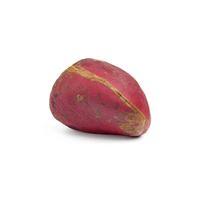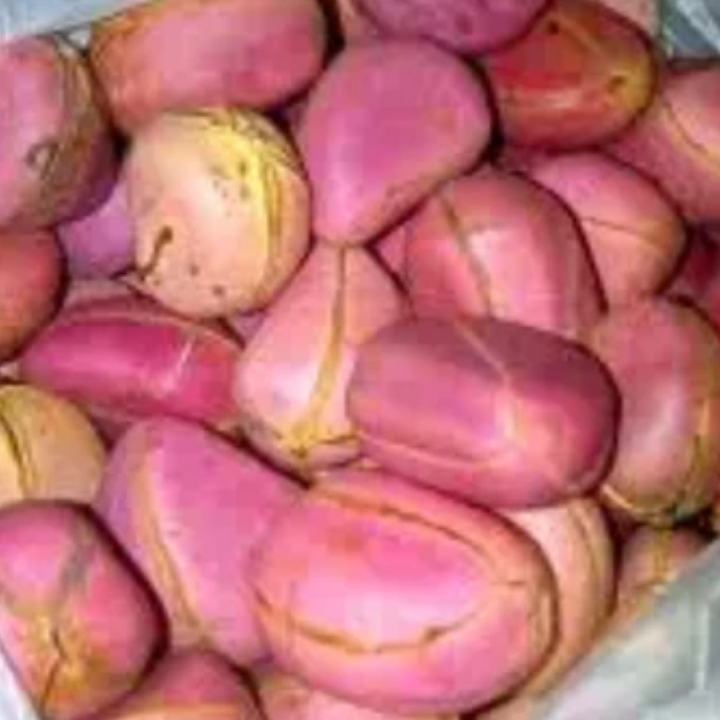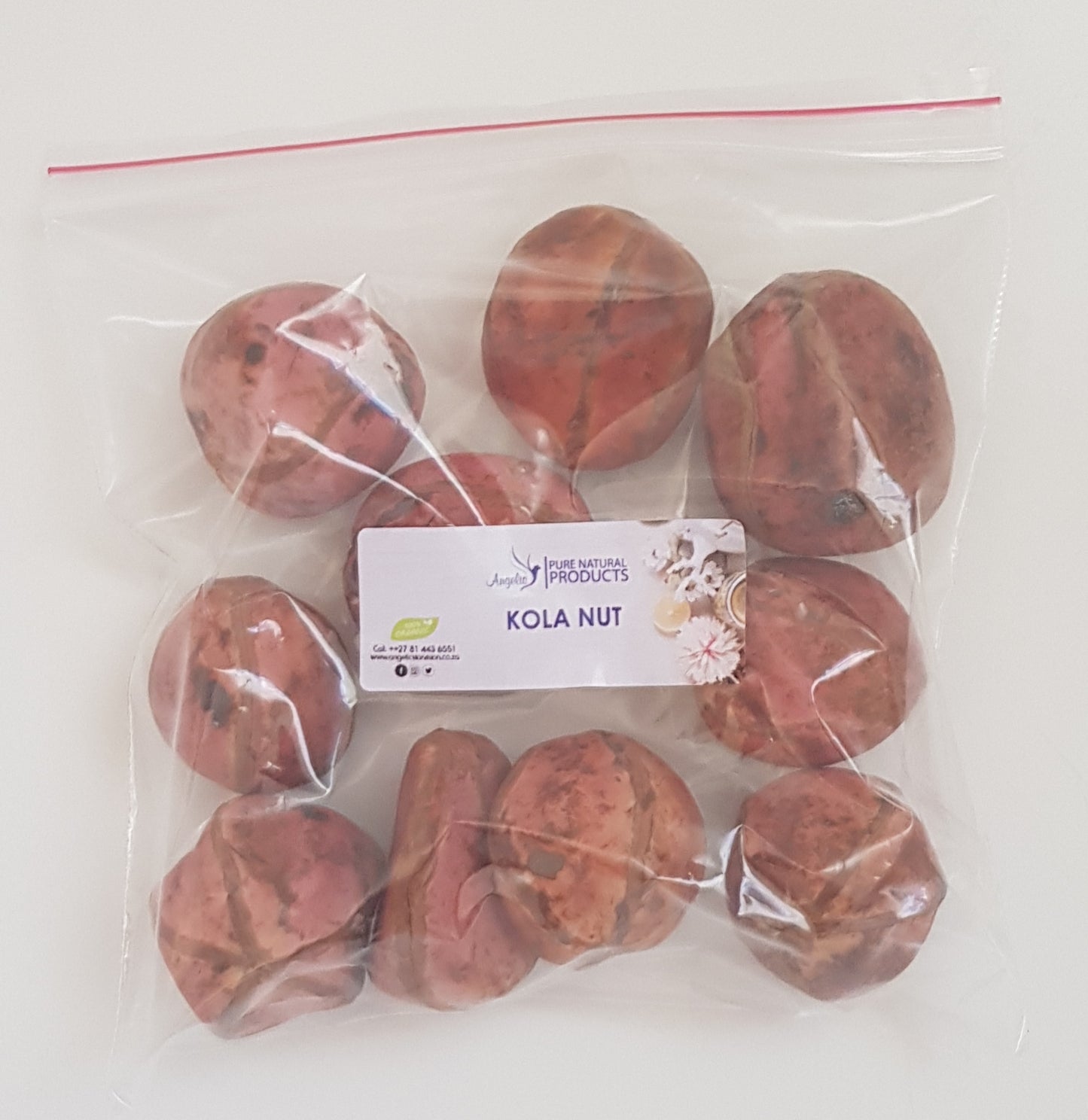angelicpurenaturalproducts
Kola Nut (Oji Igbo)
Couldn't load pickup availability
Kola Nut is the nut inside the fruit of the evergreen kola tree, which grows in Africa’s rainforests. A white shells enclose the seeds or kola nuts inside the star-shaped fruits of the tree. It is a significant cultural emblem for many ethnic groups in Nigeria. It’s presented as a gift during weddings, funerals, and naming rituals, as well as being utilized in medicine. The cracking of the kola nut ceremonially is vital for making guests feel welcome at a community or gathering.
There are two types of kola nut Oji Igbo and Oji Hausa (Kworo)
But we sell only Oji Igbo.
Oji’ referred to as kola nut, is clearly to be one of the very many customs that unites the Igbos’. It is a valuable fruit of great importance in the Igbo community and other cultures. In Igbo land, kola nut is customarily presented to visitors as a token of welcome, hospitality and acceptance, along with other things like local drinks (palm wine,
Oji (kola-nut seed) is used in various occasions like in naming and marriage ceremonies, during initiation, oath taking and the likes. It is the first thing to present to a visitor after exchanging greetings. In any social gathering, oji is the first thing to present during entertainment.
Kolanut is not sweet to chew but it is a vital part of Igbo traditional society. Kolanut features in almost all Igbo ceremony. Serving kolanut to a visitor indicates a heartily welcome to the person.
There is nothing that could substitute kolanut in Igboland. When a visitor enters the home of an Igbo person , if there is no kolanut to serve, the host can say "akọna m ọnụ ọjị", "ka m jide gị ụgwọ ọjị", "ọjị juru ụlọ" or "abalị atala ọjị" (that is, if the visitor came in the night).
Traditions Surrounding Igbo Kolanut
The breaking of kolanut is a tradition held in high esteem in Igboland. Some of these traditions includes
- A woman does not climb the iroko tree (osisi oji) in Igboland. It is considered as a taboo and abomination.
- When a person steals anything aside kolanut in Igboland, he or she will be punished but when kolanut is being stolen, it is seen as a great abomination.
- Men break kolanut both young and elderly. People that commits abomination (ihe ala na-asọ nsọ) do not break kolanut hence, the Igbo saying "ọjị bụ nwa Amadị, aka rụrụ arụ anaghị aga ya n'ihu. " (kolanut represents freedom, a filthy hand does not touch it).
- A man does not break kolanut at his in-laws place.
- An elderly will not be in a gathering and a young man breaks kolanut. It's seen as being disrespectful. Unless the elderly man delegates the duty.
- A woman does not break kolanut in the mist of men neither does she pray with it (iji ya gọọ ọfọ).
- A woman can present a kolanut but can not break it, unless she is a native doctor. She can break it and eat alone with her spiritual entities. She has to present a separate one to the male folks to break by themselves.
Types of Igbo Kolanut
The kolanut without partition (nke gbara naanị otu ibe or nke gbaghị ibe ọbụla) is called blind kolanut (ọjị isi). This kolanut is considered as a bad omen. Human and spirit do not accept it. This type of kolanut is trashed once seen.
Another interesting Igbo kolanut is ọjị ikenga or ọjị dike (mighty kolanut) It comes in three partitions which is considered as wholeness or completeness. It is a kolanut that brings good fortune.
Other types comes in four, five, and six partitions. The four partitioned kolanut represents Igbo four market days known as Eke, Orie, Afọ, and Nkwọ. It is also a good kolanut. The five and six partitioned kolanut point towards wealth. Whoever that breaks these types of kolanut have the believe that wealth is coming to him.
The kola nut is consumed during Ceremonies, rites and rituals in Igbo
Oji is used to consult and receive or send messages from spirits.
- It is used to enter into covenant in order to retain relationship or partnership.
- It is used to plead on one's behalf or another's behalf. It can also be used to ask for a favour.
- It is used to ask for a woman's hand in marriage (to her people not to the lady directly. The man will have to send kolanut to the parents of the lady he wants to marry, declaring his intention).
- It is used to say a prayer (ịgọ ọfọ). For instance, during the naming ceremony of a child, elders use kolanut to pray to Chukwu Okike (The Almighty God)
- It is used to welcome visitor/s.
- It is used for divination and sacrifice
- It is used to conduct traditional & white weddings, coronations, naming, burial etc
The kola nut has a long history as a traditional treatment in West Africa, and it has a broad variety of applications
. Health Benefits
.Boosts the body’s metabolism
. Aids mental alertness and sharpness
. Increases energy level
. Enhances sexual performance
. Clears the throat
. Increases the Heart rate
Materials
Materials
Shipping & Returns
Shipping & Returns
Dimensions
Dimensions
Care Instructions
Care Instructions



Image with text
Pair text with an image to focus on your chosen product, collection, or blog post. Add details on availability, style, or even provide a review.
-
Free Shipping
Pair text with an image to focus on your chosen product, collection, or blog post. Add details on availability, style, or even provide a review.
-
Hassle-Free Exchanges
Pair text with an image to focus on your chosen product, collection, or blog post. Add details on availability, style, or even provide a review.



